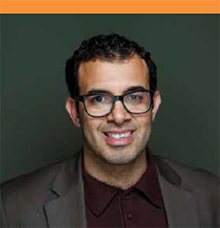In Their Own Words
Finance & Development, June 2017, Vol. 54, No. 2
Niccole Braynen-Kimani and Maria Jovanović
Millennials reflect on the key challenges facing their generation

Are today’s young people hopeful or dispirited? Are they finding good jobs and saving for the future, or living paycheck to paycheck? Do they believe education is the key to economic success, or does entrepreneurship—and operating outside the established system—have more appeal for them? F&D asked youth leaders from around the world to weigh in on the challenges of their generation and whether they see themselves as better or worse off than their parents’ generation.
Our informal survey took us to different corners of the globe—to China, Egypt, France, Nigeria, and Peru. Five millennials gave us their take on what is important to them individually and collectively as a segment of the global population that is facing unique challenges in a shifting global environment.
All the young people saw their generation as being a central part of a global village, connected through technology and easy access to information, and an era of global citizenship. “This generation constructs bridges, not walls,” says Mariel Renteria of Peru. They also see their cohort as having a more entrepreneurial spirit, whether by economic necessity or through force of will.
So what is on the minds of young people around the world? Should they take a menial job just because there’s nothing better? And just what would they tell their policymakers if they had the chance? Five influential youth reflect here on what motivates or intrigues them.

PERU: Mariel Renteria
Cofounder and board member of Kunan,
a nonprofit organization that supports young social entrepreneurs
Mariel Renteria is a strong believer in the power of education to encourage her country’s younger generation to develop a positive, entrepreneurial, and global vision. A deep interest in education is a key driver for young Peruvians, Mariel says. She points to a poll by IPAE Acción Empresarial in CADE Universitario, the foremost university student summit in Peru, that highlighted not only the importance of access to quality education but also a national commitment to the improvement of the education system. She applauds the Peruvian Education Ministry’s success in recruiting high-quality, committed, and innovative young public officials. “One fact that differentiates this generation is that today, education is perceived as a fundamental means of furthering individual development and that of society as a whole.”
Better and more sustained education can also connect disadvantaged young people in rural areas with opportunities in the cities. “Social inequality is a national issue to tackle as well as a challenge that allows us to be united. The most important contribution from policymakers should be a quantum leap in the national education system, improvements to digital and infrastructural connectivity, and the promotion of additional platforms that connect us with the world.”

FRANCE: Thiébaut Weber
Confederal Secretary, European Trade Union Confederation
“Nature abhors a vacuum,” says Thiébaut Weber, invoking Aristotle. This young leader sees innovation as a way forward for youth in his region. “Many innovative projects are underway on the ground in areas like short circuitry, coworking spaces, defense of digital-platform workers, solidarity with migrants, and cooperatives. Young people are taking part in these initiatives. Their will to act is welcomed and needed in the labor movement. Trade unions are tremendous ‘fab labs’ to realize new ideas.”
Thiébaut believes a good job is one in which the worker feels empowered—a founding belief of the labor movement, he notes. “In a good job, workers are also secure and respected, regardless of age and status. Whether on the payroll of a company or self-employed, in the end you are a worker.”
He adds that being secure also means being protected against unfair dismissal or from being abusively “deactivated” from an online platform, and having a job that provides a fair wage to allow workers to contribute and benefit from social protection.
He believes too in the need for policymakers to consider young workers as a long-term investment in the future. They should focus not only on growth and job creation but also on the quality of jobs. “A precarious and low-paying job is not ‘better than nothing.’ Young people are hard workers. But employers and policymakers should not consider this as a sign of docility. They should bear in mind that precariousness contributes to the rise of extremism.”

EGYPT: Jawad Nabulsi
Founder of Nebny Foundation for Development,
an after-school program for primary school students
Through the Nebny Foundation for Development, an organization he founded, Jawad Nabulsi has had the opportunity to interact with many young people living in the impoverished Manshiet Nasser area of Cairo. Despite having been dealt a difficult hand, he observes, these youths show a remarkable desire to “create, curate, explore, and learn through trial and error.” When the formal education and employment systems fail to provide them the tools and opportunities they need, the younger generation secures its own future.
To save themselves from poverty, these young people come up with creative, high-impact solutions to the problems they and their communities face. They are referred to as “invisible entrepreneurs”—operating with low budgets and without the fancy degrees or Ivy League credentials enjoyed by the elite class of entrepreneurs filling the seats at international forums and conferences. But Egypt’s invisible entrepreneurs have something better than fame to drive them. “They only seek survival, and that is probably the strongest motive for any social enterprise to take shape,” says Jawad. “They do not fit the typical entrepreneurial profile drawn by society.”
Because of their familiarity with the problems facing residents of Manshiet Nasser, these entrepreneurs are in the best position to tackle them. They know the ropes and have the passion to be agents of change.
And just a little goes a long way—the success of these entrepreneurs’ projects and ideas leads to a positive feedback loop in the community. As Jawad notes, “the roads between Manshiet Nasser and elite schools have become much shorter.” Over the years, several local nongovernmental organizations have begun offering Egyptian youth a chance to supplement their education. “Youth who were once unaware of the world outside of their neighborhood can now learn directly from world-renowned professors online,” says Jawad. The opportunities for lifelong learning offered by these organizations were unimaginable for previous generations.
The changes taking place in this poor Cairo neighborhood are largely a result of the motivation and determination of the young entrepreneurs who have actively participated in improving their own lives—and brought their whole community along for the ride. In their triumphs, Jawad finds compelling evidence for identifying and investing in other youth whose passion and innovation “contributes in immense ways to the development of their surrounding environments and societies.”

NIGERIA: Charles Akhimien
Cofounder of MOBicure, a mobile health company using technology to address health care needs in developing economies
Charles Akhimien tells the story of Chris, a young Nigerian man who is disillusioned with the lack of social safety nets in his country and across Africa. Chris earned a graduate degree in petroleum engineering and had dreams of becoming an engineer during his country’s crude oil boom by joining one of the oil companies driving economic growth in Nigeria. He imagined earning a six-figure salary—enough to take care of himself, his aging parents, and his siblings—but after four years of searching, he is not even close to achieving that goal. He has had to resort to low-paying, menial jobs to survive.
And he is not alone: Africa’s unemployment rate is among the highest of any region in the world.
Charles sees his friend’s story as emblematic of the failures of government. Political stability, an end to corruption, and a better educational system are hugely important to equipping young people with the tools to meet the demands of the modern job market, he says.
Yet Charles is hopeful. Alongside the story of pervasive youth unemployment is the story of the continent’s fast and steady strides in innovation and entrepreneurship that is already evident in cities like Nairobi, Lagos, and Johannesburg, he says. In these places, innovation hubs are springing up, largely run by young people who are changing the narrative.
“Young people represent the hope of Africa. All over Africa, youth are increasingly realizing that, in order to thrive, they have to create the future they want.”

CHINA: Kathy Gong
Cofounder and chief executive officer of WafaGames
Kathy Gong believes in the power of individuals to map their own destiny through determination, grit, and creativity. She sees members of her generation as possessing these characteristics.
Her determination led her to fight against hukou, a national system of household registration that determines where citizens officially reside, and by extension means unequal access to health care, property ownership, and basic education. She tells the story of how her parents decided to move from their rural community into a city to start a business. After being denied entry into an elementary school because of the hukou rules, she enrolled in a chess school and eventually became the youngest national chess champion at the age of 10.
Kathy sees other young people in her country as similarly self-driven and motivated to have a better life—willing to lead rather than follow. But she acknowledges that her generation also feels more stressed because of changing workplace dynamics and worries about having enough money to afford children, a place to live, and eventual retirement.
“Our future depends on the young people because they are the core of creativity, the force behind breakthrough innovation, advocates for a fairer society, and drivers of economic growth and societal improvement,” she says.


